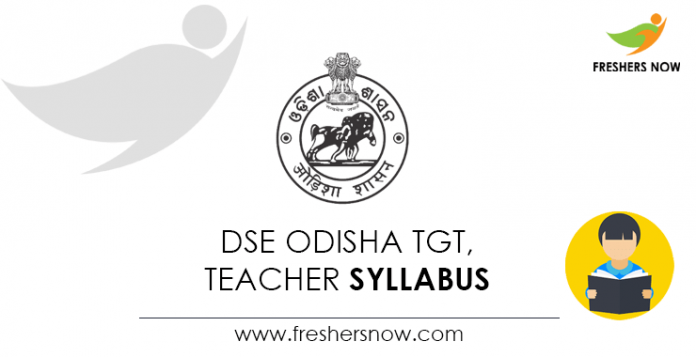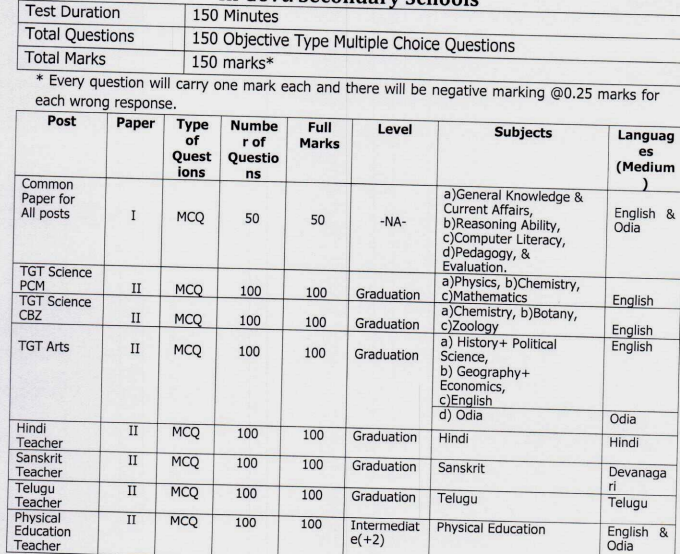
DSE Odisha TGT, Telegu Teacher Syllabus 2025 PDF Download & Exam Pattern: Applied candidates can get the DSE Odisha TGT Teacher Syllabus 2025 from this article. Applicants who are eagerly waiting for the DSE Teacher Syllabus 2025 can collect it from this page. The officials of the Directorate Of Secondary Education Odisha have released the notification for the Trained Graduate Teacher (Arts, Science (PCM, CBZ)) & Telugu Teacher, Hindi Teacher, Sanskrit Teacher, Physical Education Teacher posts, and also going to conduct the exam on the scheduled date. To check the detailed DSE Teacher Syllabus check below sections.
Also get the latest DSE Odisha TGT, Teacher Exam Pattern 2025. The Trained Graduate Teachers & Telugu Teacher Exam is of Objective Type Multiple Choice Questions of subjects General Knowledge & Current Affairs, Reasoning Ability, Computer Literacy, Pedagogy, Educational Management, and Policy & Evaluation, Physics, Chemistry, Mathematics, Botany, Zoology, History, Political Science, Geography, Economics, English, and Odia for 150 Marks. The total time duration for the DSE Exam is 150 Minutes. There will be a negative marking @ 0.25 marks for each wrong response
DSE Odisha TGT, Teacher Syllabus 2025 – Details
| DSE Odisha TGT, Teacher Syllabus 2025 & Exam Pattern PDF Download | |
| Organization Name | Directorate Of Secondary Education, Odisha |
| Post Name | Trained Graduate Teacher (Arts, Science (PCM, CBZ)) & Telugu Teacher, Hindi Teacher, Sanskrit Teacher, Physical Education Teacher |
| Category | Syllabus |
| Job Location | Odisha |
| Official Site | dseodisha.in |
DSE Odisha TGT, Teacher Exam Pattern 2025
The DSE Odisha TGT, Teacher Exam Pattern 2025 plays an important role in the DSE Exam. The below table consists of details like negative marking, number of marks, subject names, and others. The level of paper-2 will be Graduation in the English Language. The total number of questions is 150. Each question carries 1 mark, and the total exam will be 150 marks. The total time assigned for the DSE Odisha TGT, Teacher Exam is 150 Minutes.
For Trained Graduate Teacher Post
| Papers | Number Of Questions | Number Of Marks |
All Posts – Paper 1
|
90 Questions | 90 Questions |
TGT Science PCM – Paper-2
|
60 Questions | 60 Marks |
TGT Science CBZ – Paper-2
|
60 Questions | 60 Marks |
TGT Arts – Paper-2
|
60 Questions | 60 Marks |
For Telugu Teacher Post
| Papers | Number Of Questions | Number Of Marks |
Common Paper: Paper 1
|
90 Questions | 90 Questions |
| Telugu Teacher – Paper-2
Telugu |
60 Questions | 60 Marks |
The level of paper-2 will be Graduation in the Telugu Language. The total number of questions is 150. Each question carries 1 mark, and the total exam will be 150 marks. The total time assigned for the DSE Odisha TGT, Teacher Exam is 150 Minutes.
DSE Odisha Pattern

Note:
- A candidate has to secure a minimum of 25%marks (20% in case of candidates of SC/ST/PWD category) Paper I
- 35% marks (30% in case of candidates of SC/ST/PWD category) in Paper II to qualify in the examination.
DSE Odisha TGT, Teacher Syllabus 2025 PDF
From the below table, applicants can get DSE Odisha TGT, Teacher Syllabus 2025 according to subject-wise. We have furnished the direct links to download the DSE Odisha TGT, Teacher Syllabus 2025 in PDF for free of cost which was gathered from the official site of the Directorate Of Secondary Education.
Section – I General Knowledge and Current Affairs
- Current events of State (Odisha) of National and International Importance
- History of Odisha/ India and the Indian National Movement
- Indian and World Geography
- Indian Polity
- Economic and Social Development
- Everyday Science
Section – II Reasoning Ability
- General mental ability,
- Logical reasoning and analytic ability
- Decision making and problem solving
- Basic numeracy
- Data interpretation
Section – III Computer Literacy
- Basic computer literacy skills for use of ICT in classrooms
- Concepts, terminology and operations that relate to general computer usage.
- Basic Hardware of Computer
- Common Applications,
- Networking and Internet
- Social Networking
- Digital Citizenship
Section – IV Child Development, Pedagogy, Educational Management, Policies & Evaluation – 30 Marks
(For the posts of Hindi, Sanskrit, TGT Arts, TGT Science (PCM), TGT Science(CBZ) and Telugu Teacher)
- Child Development (Process of Growing Up)
| Growth and Development |
|
| Factors Affecting Different Developmental Aspects |
|
2. Learning Process / Pedagogy
| Understanding the Learning Process |
|
| Organizing Learning |
|
| Addressing Classroom Diversity |
|
3. Educational Management
- Educational Management: Concept, Importance and Scope, Types of Management, Democratic and Autocratic, Centralized and Decentralized
- Management Structure at different levels, National/State/ District/Sub – district (BRCS, CRCS, SMCS, SMDC)
- School Development Plan (SDP): Concept, purpose, Key action by Headmaster, students, Parents and SMDC
4. Educational Policies and Programmes
- National Educational Policy 2020
- RTE Act, 2009
- National Curriculum Framework, 2005
- SSA, RMSA and Samagra Shiksha
5. ASSESING THE LEARNER / PERFORMANCE (EVALUATION)
| Assessment and Evaluation |
|
| Assessment and Learning |
|
| Test Construction |
|
| Recent Developments in Assessment |
|
Section – IV Pedagogy, Educational Management, Policies & Evaluation – 30 Marks
(For the post of PET)
- Child Development (Process of Growing Up)
- Growth and Development
- Meaning of Growth & Development
- Different Stages of Development
- Physical, Mental, Emotional and Social Development of a child
- General Characteristics of various stages of growth and development of a child
2. Pedagogy
- Teaching Techniques (Lecture method, Demonstration Method, Discussion method and Project method etc.)
- Important devices and methods of teaching
- Teaching Procedure – Whole method, Part method, Whole and Part method
- Difference between teaching methods and Teaching Aids
3. School Management & Evaluation
- School Management
- Programme planning, principles of programme planning in Physical Education
- Function of planning – organisation of school sports, coordination and
- contracting of Physical Education activities
- Evaluation of School Physical Education Activities and School Health Education Programme
DSE Odisha TGT Teacher Syllabus 2025 Download Link
| DSE Odisha TGT, Teacher Syllabus 2025 PDF Download | |
| To Download The DSE Odisha TGT, Teacher Syllabus 2025 PDF | Download Syllabus |
★★ Reasoning Questions ★★
★★ GK Questions ★★
Applicants can get the DSE Odisha TGT, Teacher Syllabus 2025 from this article. For more updates, you can also visit that is Freshers Now.
| ★★ You Can Also Check ★★ | |
| Odisha Govt Jobs | Odisha Employment News |
| Trained Graduate Teacher Jobs | OPSC Recruitment |
| DSE Odisha TGT, Teacher Previous Question Papers | |



